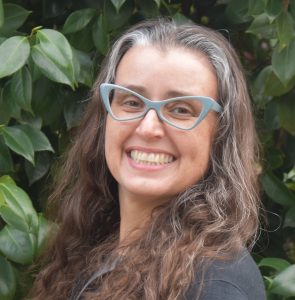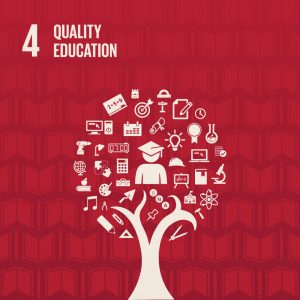By Grace Reilein.

When was the last time you rode a bike to work? Yesterday? Every day this week? How about for the last 25 years? Becki Retzlaff falls in that final group, and as the newest Director of the Academic Sustainability Program, it could not be more fitting. Becki has served as the Director of the Academic Sustainability Program at Auburn since January 2022. She has been a professor at Auburn for sixteen years and previously worked in the community planning program before taking on her current role in academic sustainability. Becki was friends with the first Director of Academic Sustainability, Nannette Chadwick, and has been connected to the program since its start.
Since Becki is new to her position at Academic Sustainability, she made sure to take time to fully understand the program and placed importance on meeting with faculty and students on campus. In the past, the Academic Sustainability Program has run faculty training workshops as well as promote sustainability research on campus. Becki is working with the Office of Sustainability to continue supporting this part of the program. Additionally, she is designing new promotional materials and signing up to participate in events around campus. Becki has created new games for tabling events to increase engagement with prospective students. She also spoke with students in the program to get to know them and receive comments about the program to improve it. Becki also collaborates with the Sustainability Auburn Alumni Affiliate for future projects related to the Academic Sustainability program.
In terms of the Minor in Sustainability Studies program itself, Becki hopes to structure it like the other interdisciplinary minors within the College of Liberal Arts. Other programs, such as Women’s Studies and Africana Studies, are structured as affiliate programs. This means if a professor teaches within the program, they must be an affiliate faculty member. There are several benefits of transitioning the Academic Sustainability Program to an affiliate program. First, it is clearer who is actively engaged within the program rather than just having something to do with sustainability. Second, the program will be able to hold annual open houses with the affiliate faculty members where they can help with course decisions and add more to the curriculum. These benefits all facilitate a more democratic structure within the program. The goal of an affiliate program is to promote involvement from faculty and not have the minor being led solely by the director.
As mentioned before, Becki has been a part of Auburn University for quite some time. When asked about opportunities for change on campus, she recalled that the Melton Student Center Campus Green used to be a parking lot. At the time, the university held multiple open meetings to discuss removing that parking lot and creating a greenspace. This space would be a much more walkable, sustainable environment, but there was a lot of push back from staff and faculty. Removing the parking lot would make it more inconvenient for those who worked nearby, as they would have to walk a bit farther. However, campus parking and planning went through with the plan, and now staff, students, and faculty alike all enjoy the greenspace. Becki brought up this example to highlight how the campus can make more sustainable changes and emphasize the importance of attending open decision-making meetings to support these changes.
In addition to supporting changes such as the greenspace, Becki suggests that students get involved on campus. There are a lot of unique student-led groups that are doing amazing things in the Auburn community in the world of sustainability. She spoke about Permaculture Tigers and Campus Kitchens. Becki also believes if there is not a group focusing on what you are interested in, you should create a new one! There is always room for more change-making groups on campus. It can be easy to get lost in the academic side of sustainability, but Becki emphasizes the importance of being involved in non-academic activities as well. Biking to and from class or work is also a great way to make a change, something that Becki has been committed to for years. Not only will you reduce the money spent on parking permits, but you will also reduce emissions from your vehicle and incorporate more movement into your life. Becki explained that biking allows her to cool down between home and work life, allowing her to get into a new mindset.
The Academic Sustainability Program is growing here at Auburn University. Becki hopes to see more staff, faculty, and student involvement in the coming years. From declaring a minor in Sustainability Studies, to participating in workshops, to just becoming a member of a student-led organization on campus, there are many ways to become involved in sustainability at Auburn and make a change.
Post contributed by Grace Reilein, Program Coordinator, Auburn Office of Sustainability
Learn about the SDGs & AU and Auburn’s contributions related to this post:





